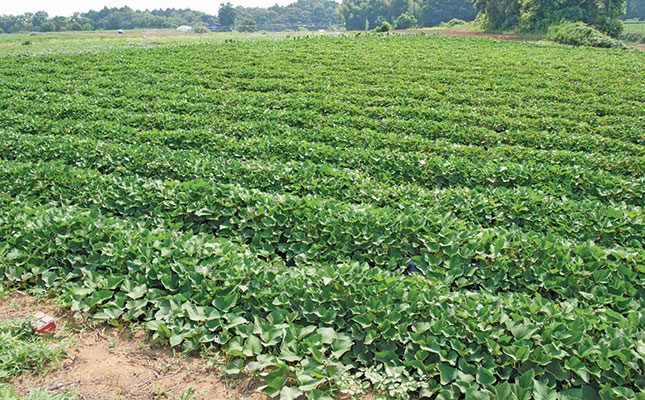
Photo: Wikimedia Commons
Concerns about the use of chemical pesticides (resistance development, risks to human and animal health and the negative effects on the environment and non-target organisms) have prompted governments around the world to develop policies that regulate their use and seek alternatives.
Biological control is the employment of natural enemies to decrease the damage caused by pests to bearable levels. Organisms are used in biological control strategies, but they usually need active human management as well. There are numerous advantages of making use of biological control measures.
For one, they optimise the cost of production (a benefit to the farmer) and the cost of food (a benefit to the consumer) while also providing the long-term benefit of increased overall food production.
Moreover, they fit well as components of integrated pest management (IPM). IPM is defined as a sustainable approach to crop production and protection that combines different management strategies and practices to grow healthy crops and minimise the use of pesticides.
The Food and Agriculture Organization of the United Nations promotes IPM as the preferred approach to crop protection and regards it as a pillar of both sustainable intensification of crop production and pesticide risk reduction.
Sustainable crop production is a form of farming that focuses on having minimum environmental and human health implications and includes the maintenance of farm economic stability, enhancement of farmers’ techniques and quality of life.
How EPNs work
Various types of biological control agents have been used successfully over the years. One is entomopathogenic nematodes (EPNs).
These are microscopic, soft-bodied, non-segmented roundworms that occur naturally in the soil and can be employed as biological control agents against a variety of insect pests.
They have a wide range of hosts and can actively search for their host without harming other organisms and the environment in the process. They have proven to be one of the most successful biological control agents in Europe and the US.
Poisonous secretion
In the soil, the nematodes enter the pest through natural openings. Once inside the host, they multiply and release a poisonous secretion (symbiotic bacterium) that kills the host/pest within 48 hours.
Once they have multiplied (feeding on the host in the process), they emerge, search for other pests that have infested the crop and infect them, resulting in pest reduction without indirect environmental impact.
South Africa’s Pesticide Management Policy, Agricultural Policy Action Plan, and its Bio-economy Strategy were put in place to stimulate climate-smart agriculture, as well as the development and use of alternative products and techniques to reduce reliance on chemical plant protection products.
Market for EPNs
Scientists in South Africa and elsewhere are developing EPN-based bio-pesticide products.
EPNs have been commercialised since the early 1980s in the US, but the successful control of many insect pests by EPNs has not led them to occupy an important position in the pesticide market. This is due to their perceived cost, reliability, limited demand and insufficient knowledge on the part of the end user.
Despite these challenges, the need for sustainable intensification of crop production and pesticide risk reduction has led to more EPN projects and programmes being commissioned globally.
Research has been undertaken in order to improve EPN production, storage and formulation in other parts of the world.
Developments in the research of EPNs indicate they could potentially be substituted for chemicals. This is expected to result in the creation of more EPN markets in different climate zones.
In addition, studies have shown that farmers use EPNs for pest control only when EPN
use is more profitable than alternative strategies. At the same time, the projected
global rise in demand for organic products is expected to see an increase in the demand for EPNs.
In South Africa, the use of EPNs is relatively new and there are still ongoing trials and research on their efficacy and acceptance.
The ARC is currently developing EPN-based bio-insecticides for use against several soil-borne insect pests, including the black maize beetle, cutworm, false wireworm, wireworm and the pupae of the African bollworm.
Research is being performed to see how effective EPNs are in controlling sweet potato weevil.
Potential acceptance
A complementary socio-economic study was also conducted to evaluate the acceptance of EPNs by smallholder sweet potato farmers in Gauteng, North West and Limpopo. The study revealed a general lack of awareness about the potential of EPNs as bio-pesticides.
Interestingly, the farmers were willing to accept EPNs based on their environmental ‘friendliness’, sustainability, affordability and compatibility with other agrochemicals. This suggests a potential market if EPNs were to be produced for use by farmers.
The study recommended that training on how to use EPNS and promotion of a better awareness of EPNs and their benefits as biocontrol measures be conducted for farmers and agricultural extension officers.
Such awareness could be implemented through information days on the lands where demonstration trials are conducted, aimed at informing farmers and extension officers about the importance, mode of action, application, and impact of EPNs on insect pests, crops, and soil health.
Email Mankaba Matshidiso Whitney Matli at [email protected].











